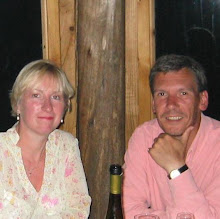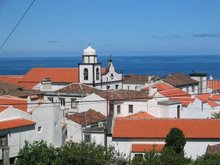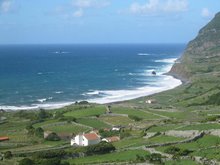Last Sunday (28 April) was another driech day with strong east winds. Being on the west coast of the island should mean you're sheltered from easterlies but, in practice, what happens is vicious gusts scream down off the cliffs, whipping the surface off the sea. At one point, I glanced out the window and saw a white spot which I initially took to be spindrift but, on closer examination, turned out to be a yacht.
Having been a minor league yottie on the west coast of Scotland in a previous life (though only a coastal day sailor which is a totally different kettle of rabbits from cruising the oceans), I immediately reached for the binoculars and followed its progress, smashing through the heavy seas, beating to windward close hauled (that's yot-speak for something it would be too tedious to explain to non-yotties) southwards (right to left) until it disappeared from view.
About an hour later, however, the yacht re-appeared much closer inshore, coming from left to right now ...
Makes sense, I thought: harbour at Lajes totally untenable in easterly, probably better off in comparative shelter of west coast at Faja Grande even with these gusts off the cliffs (although by now, the wind had moderated somewhat). The fact the yacht had approached FG by first disappearing out of sight to the left (south) and then reappearing inshore going in the opposite direction (instead of heading straight in from the position in the first photo) also made perfect sense to me as a nautical cove for reasons which, once again, I'll spare you. What did appear odd, however, was that the yacht was now closing the coast with only its foresails (the ones in front of the mast) set. To my coastal sailor's mind that breaks every rule in the book and I ascribed it to some mystery of oceanic sailing I was uninitiated in. Curious, however, I went down to the seafront for a closer look.
.jpg)
If there is one rule in the yottie's book (be he coastal or offshore), it's that, whenever you attempt an unorthodox manoeuvre within sight of land, there will be someone on shore peering through binoculars making adverse comments ("What the hell's he doing that for?") Subsection (1) of that rule is that, once close enough in, the same person will drop the binoculars and begin to communicate with you by ambiguous hand gestures. One of these involves cupping his hands round his mouth with no apparent result. Subsection (2) involves a second person joining the first and making gestures which appear to contradict the first person's.
Having proverbially "been there, done that", I forebore from any attempt at communication with the yacht ("I say! Once you've dropped the hook - over THERE would be better! - do row ashore and pop up for pre-prandials!") Anyway, it was one of these days, weatherwise, getting dark soon as well, when I was pretty glad to be able to step back into a car and drive home rather than being on a yacht, keeping watch in the rain taking transits fretting about whether the anchor was going to hold.
The following morning (Monday, 29 April), I happened to glance out the window and see the Lajes pilot cutter apparently attempting to rendezvous with the yacht and take it under tow.
Very difficult in a big sea but after
much to-ing and fro-ing a line was secured and off they went.
I asked José António at the shop if he'd heard what the story was but he hadn't and, beyond looking at the
Lajes webcam to checking that the yacht had duly arrived there (it had) ...
... I didn't think about it again until Friday (3 May) when I got a tip that there was a blog by a solo yachtsman who'd fetched up in Flores in slightly fraught circumstances and did I know anything about this?
Turns out the yacht is called
Wild Song and belongs to one Paul Heiney (British readers may recognise the name of the BBC radio presenter.) You can read the blog
here - for the approach to Flores, scroll down to the entry titled "Low in every sense" on 24 April and read up.
The long and short is, after cruising in Patagonia for the winter (our winter - summer in the Southern Hemisphere of course),
Wild Song left Uruguay on 25 February bound for her home port of Falmouth, UK via a planned stop at Horta on Faial in the Azores (a popular yachtsman's harbour). After nearly two months at sea,
Wild Song was within 140 mile of Horta when contrary winds drove her west. Moreover, the yacht's engine wouldn't start due to dirt in the dregs of the fuel tank. The main problem that caused was no power for the water maker. Hence Paul decided to make for Flores instead.
In the unseasonably awful weather we've been having this spring, he described the 48 hours around his arrival at this island as the worst in his yachting experience.
To add to the lack of an engine,
Wild Song's mainsail tore catastrophically during the approach to the dubious shelter of Fajã Grande. That explains the unusual set of sails I observed. In anything but the most benign of conditions, a yacht is very difficult to manouevre without a mainsail. And having lobbed out 60 metres of chain to anchor at FG, which would be almost impossible to get back up by hand without the engine to power an electric windlass (machine to pull chain up), all these factors combined to make Paul (reluctantly as a very last resort, I should imagine from my own experience) call for help. This was achieved by phoning the UK coastguard on his mobile who contacted their opposite numbers in Portugal and the net upshot was the pilot cutter (boat) came round the next morning to tow
Wild Song to Lajes - a distance of about 12 miles (19km). Note also that the pilot cutter is kept out of the water and have had to be launched by crane to meet this exigency.
 |
| 12 miles (19km) from FG to Lajes |
Four members of the pilot cutter's crew boarded
Wild Song to assist with pulling up the anchor, a process which took 45 minutes (for any non-nautical coves still reading, it normally takes about 5 minutes, max).
But the troubles were only just beginning. With the yacht now free of her anchor, the tow rope to the pilot cutter broke five times before they got under way. On one occasion, Paul describes this as happening so close to the rocks of the shore, he could barely look. That must have been the lowest point of the worst 48 hours.
I watched this entire performance through the binoculars from my kitchen window and feel rather guilty now I was rubber-necking an event which must have been traumatic in the extreme for the participants.
 |
| Library picture of Lajes das Flores marina earlier this year |
Anyway, a happy ending. They duly arrived at Lajes. An engineer came and fixed the engine and attempted to only charge 6 Euros! The tow round from Faja Grande cost only 100 Euros which seems pretty blooming reasonable to me. All in all, I think Paul Heiney will have some good memories of my island despite his inauspicious arrival thereat.
As I type this,
Wild Song is
en route to Horta on Faial, 120 miles east, powered by a combination of light following winds and her engine as necessary. At Horta, she can get her main sail repaired (essential to face the long haul back to Britain).
I shall be following the blog with interest from hereon in. I was amused by the fact that, despite the trauma of his arrival in the Azores, Paul managed to pen the very shrewd observation that, in centuries gone by, sailors judged their proximity to land by smell, colour of the sea, seabirds, stuff floating in the water etc. etc. Nowadays, it's by a text message from Vodafone as your mobile phone acquires a signal saying "Welcome to Portugal! Calls to the UK cost ..."
How true!
And a post-script on reading the blog was Linda at the shop who said "A tomato sandwich? Where'd he get from the tomato from?" It's a not entirely tongue in cheek allusion to the scarcity of fresh veg on such a verdant island (and how the vast majority of such of it as we do get is imported from other Azores or even further afield).





.jpg)
.jpg)
.jpg)
.jpg)


















